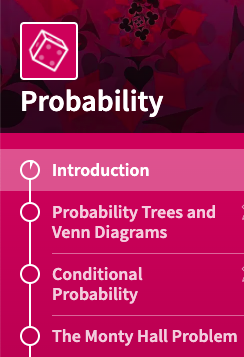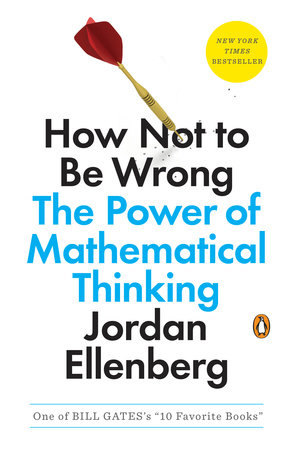I was recently asked for some recommendations of resources for learning about probability and statistics, for someone without a strong mathematical background. I did a little digging, and have collated what I found here in case it’s useful to anyone else. Add your own suggestions in the comments!
Online

Mathigon is an online interactive maths textbook, aimed at people with a school level of maths, and has a course on probability – with new content being added all the time.
Khan Academy offers free online maths courses, including one on Statistics and Probability.
Seeing Theory has some excellent interactive visualisations of concepts from probability and statistics.
The National Numeracy website has a course for people who want to improve their maths, which includes a large chunk of content on understanding and interpreting data and is aimed at beginners.
There are also plenty of YouTube videos about probability, including this introduction to the history of probability from Kelsey Houston-Edwards on the PBS Infinite Series (which also has videos on Random Walks and Markov Chains).

There are also plenty of Numberphile videos covering probability topics and a few on statistics, and Grant Sanderson has done a few probability videos over at 3Blue1Brown.
Books
Here’s a selection of popular maths books which focus on statistics, probability and data – there are plenty out there! (We’re not able to supply any specific opinions about how good any of these will be, but hopefully this list is useful!)
The OUP’s excellent ‘Very Short Introductions’ series includes Probability: a Very Short Introduction by John Haigh. David Spiegelhalter has several books on probability, stats and risk, including The Norm Chronicles (with Michael Blastland), Sex By Numbers and The Art of Statistics.
Fat Chance: Probability from 0 to 1 is written by Emily Riehl, Benedict Gross and Joe Harris. Prolific maths author Ian Stewart has Do Dice Play God? The Mathematics of Uncertainty, and following on from a book on Fermat’s Last theorem, Amir Aczel has written Chance: A Guide to Gambling, Love, the Stock Market & Just about Anything Else.
There’s also Randomness by Deborah J. Bennett, and Chances Are… Adventures in Probability by Ellen and Michael Kaplan. Derek Rowntree has a book called Statistics Without Tears, which attempts to be an introduction for non-mathematicians.
The Signal and the Noise: Why so many predictions fail – but some don’t is by statistician and FiveThirtyEight founder Nate Silver, whose political predictions hit the news around the 2016 US election. Dicing with Death – Chance, Risk and Health by Stephen Senn has more of a medical focus, while Against the Gods: The Remarkable Story of Risk by Peter L. Bernstein covers more of the economics and finance side.

The Freakonomics books, including Freakonomics, Superfreakonomics and Think like a Freak are more about economics and incentives, but include some thoughts on the role of statistics and data in modern life. Jordan Ellenberg’s How Not to be Wrong: The Power of Mathematical Thinking covers a range of topics related to mathematical thinking, with plenty of probability and statistics.
If that wasn’t enough for you, there’s another blog post at Big Data Made Simple listing 15 books to learn probability and statistics (although some might be aimed slightly past a beginner and require some maths background). David Aldous has a page with plenty of other recommendations.